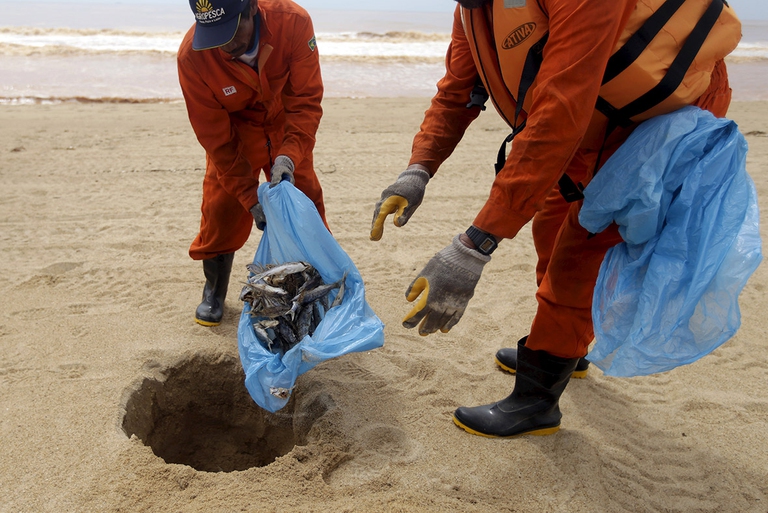
A group of experts in Tokyo suggested pouring radioactive water from Fukushima into the open sea. A marine biochemist explains the consequences of this absurd decision.
Il disastro minerario avvenuto in Brasile tre settimane fa ha devastato il bacino del Rio Doce e dei suoi affluenti, seminando morte tra gli animali e disperazione tra i pescatori.
“I don’t want to cry, but I can’t help it,” weeps Rodrigo, fisherman of Mariana. “It is all over. Not only for the river, but also for fish and fishermen”. On 5 November, two dams have collapsed in south-east Brazil, causing the worst environmental disaster in the country’s history, and one of the worst in the world.
The poisonous mudslide, containing highly toxic substances, has first devastated the basin of the Doce River and its tributaries in Minas Gerais, and then arrived to the coast and spilled into the Atlantic Ocean. It has reached the marine turtle sanctuary and the Abrolhos Marine National Park, threatening unique ecosystems.
The Doce River, one of Brazil’s largest watercourses, literally represented life, since it provided the inhabitants of the region with water, food, and jobs. “How are we supposed to survive now?” wonders a local fisherman. “I’ve been fishing for 21 years”.
Over 250,000 people lack access to drinking water, thousands of fish have died, whilst others are slowly suffocating in the toxic mud, gasping towards the sky unaware of what have destroyed their world, for a fistful of iron.
Siamo anche su WhatsApp. Segui il canale ufficiale LifeGate per restare aggiornata, aggiornato sulle ultime notizie e sulle nostre attività.
![]()
Quest'opera è distribuita con Licenza Creative Commons Attribuzione - Non commerciale - Non opere derivate 4.0 Internazionale.
A group of experts in Tokyo suggested pouring radioactive water from Fukushima into the open sea. A marine biochemist explains the consequences of this absurd decision.
The decline in grey and humpback whales in the Pacific and Atlantic Oceans has been traced to food shortages caused by rising ocean temperatures.
The United Nations has launched a major international alliance for ocean science, undertaking a mission close to all our hearts.
The cargo ship that ran aground off the coast of Mauritius on 25 July, causing incalculable damage, has split in two and its captain has been arrested.
The largest coral reef in the world is severely threatened by climate change, but researchers are developing strategies that could contribute to saving the Great Barrier Reef.
Seychelles have extended its marine protected area, which now covers over 400,000 square kilometres, an area larger than Germany.
Norwegian oil giant Equinor had pulled out of drilling for oil in the Great Australian Bight, one of the country’s most uncontaminated areas. A victory for activists and surfers who are now campaigning for the area to be protected forever.
30 per cent of the planet needs to be protected to stop precipitous species decline. The UN has set out its aims for the the COP15 on biodiversity scheduled for Kunming, China in October.
Ocean warming has risen to record highs over the last five years: just in 2019 the heat released into the world’s oceans was equivalent to that of 5-6 atomic bombs per second. The culprit, no doubt, is climate change.








